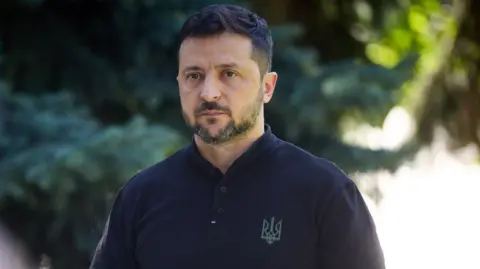Ukrainian President Volodymyr Zelensky has rejected proposals for a buffer zone between Ukrainian and Russian forces as part of a peace deal, arguing it does not reflect the realities of modern warfare.
Only those who do not understand the technological state of today's war propose a buffer zone, he told reporters on Friday.
His comments followed a report suggesting European leaders were considering a 40km (25-mile) buffer zone as part of either a ceasefire or longer-term agreement.
The war in Ukraine has evolved into a conflict driven by drone technology, and Zelensky suggested a buffer zone of sorts already existed because of the threat of drone strikes close to the front line.
Buffer zones can create demilitarized areas between warring countries, such as those seen historically in Korea or Europe post-World War Two. However, according to a report from Politico, European diplomats suggested a strip of land in Ukraine could be designated between the two forces.
Yet, Zelensky argued that there already exists a distance where heavy artillery operations are limited due to the risks posed by drones.
“Today, our heavy weapons are located at a distance of more than 10km from each other, because everything is hit by drones. This buffer - I call it a 'dead zone', some call it a 'grey zone' - it already exists,” he explained.
Zelensky also rejected any suggestion that Ukraine should concede territory within such a zone, stating, “If Russia wants to have a greater distance from us, they can retreat deep into the temporarily occupied territories of Ukraine.”
The ongoing war has seen a decline in momentum for peace talks led by US officials, with hopes fading for a summit involving leaders from Ukraine, Russia, and the West. Recent actions by Russia further complicate peace efforts, including a significant drone assault leading to civilian casualties in Kyiv.
Amidst escalating tensions and uncertainty in diplomatic engagements, key European leaders are advocating for robust security guarantees for Ukraine, aimed at bolstering its position in future negotiations.

















